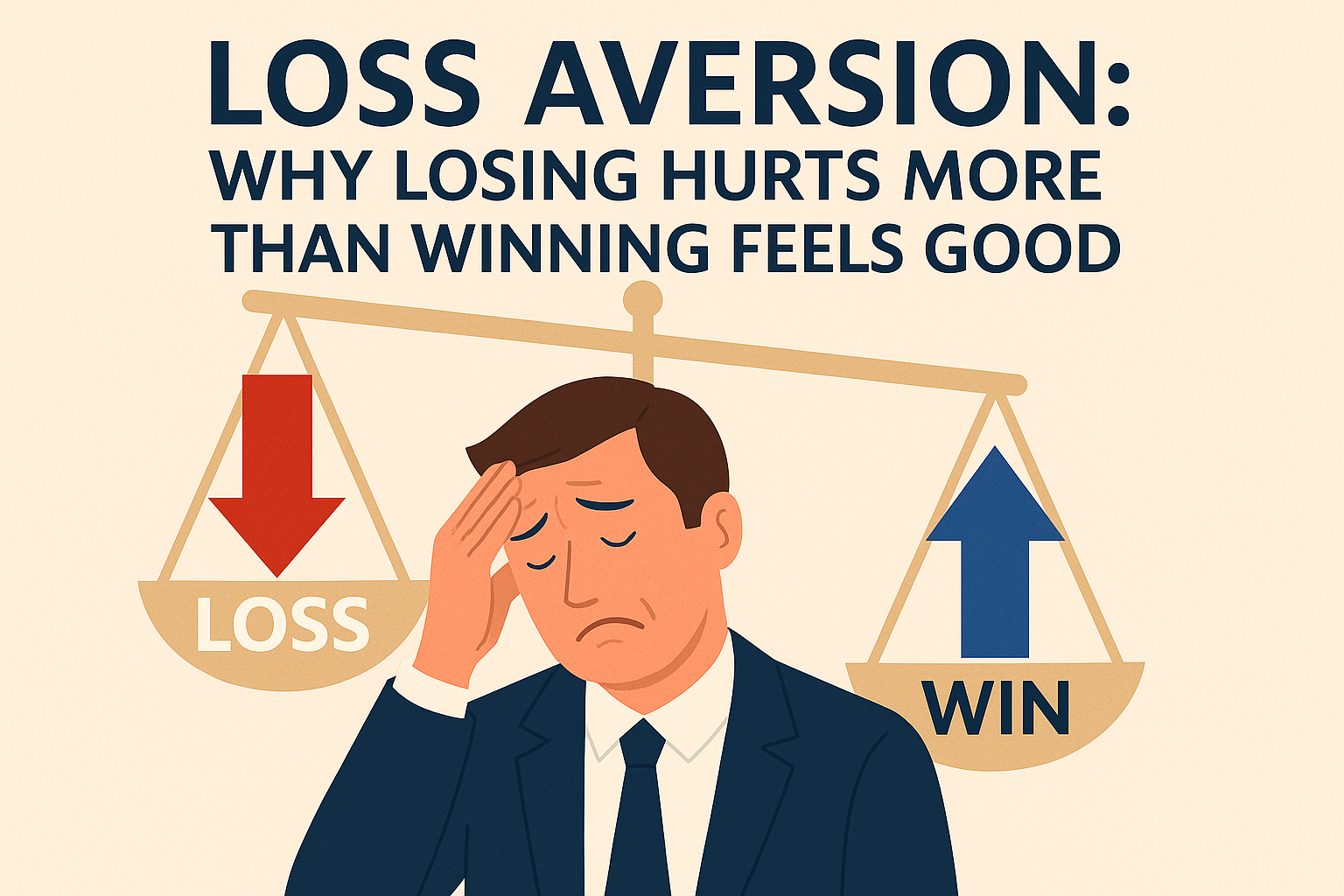Loss Aversion:
Why Losing Hurts More Than Winning Feels Good
Introduction
Imagine losing $100.
Now imagine finding $100.
Which experience feels stronger?
If you’re like most people, the pain of losing that money hits twice as hard as the pleasure of gaining it.
This psychological phenomenon is known as loss aversion, one of the most important ideas uncovered by Daniel Kahneman and Amos Tversky in their groundbreaking work on Prospect Theory: An Analysis of Decision Under Risk (published in Econometrica, 1979).
Understanding loss aversion isn’t just interesting – it’s essential for better decision-making, especially when it comes to investing.
What Is Loss Aversion?
Loss aversion means that people feel the pain of a loss about twice as strongly as the pleasure of an equivalent gain.
In other words:
- Losing $100 hurts more than winning $100 feels good.
- To willingly risk a $100 loss, most people want a chance to gain at least $200.
Kahneman and Tversky showed that people don’t think in absolute terms when making decisions. Instead, they evaluate outcomes relative to a reference point – often their current state, expectations, or what they already own.
This helps explain why people:
- Get emotionally attached to stocks they already own (even if they’re losing money).
- Prefer sticking with the status quo rather than risking a change.
- Feel a powerful urge to avoid realizing a financial loss, even when logic says it’s better to move on.
How Loss Aversion Affects Investors
Loss aversion shows up all the time in investing. Some common patterns include:
- Holding losing investments too long: Investors don’t want to “lock in” a loss, hoping the price will recover.
- Selling winning investments too soon: Investors quickly “lock in” small gains to avoid the risk of losing them.
- Fear-driven decision-making: People avoid investing altogether or panic-sell during downturns because the fear of further losses outweighs rational analysis.
This behaviour is known as the Disposition Effect, and it can drag down long-term returns.
Another major implication:
Risk-taking behaviour flips depending on context:
- When faced with certain gains, people become risk-averse (preferring a sure small win).
- When faced with certain losses, people often become risk-seeking, taking bigger risks to try and avoid accepting a loss.
Understanding this shift is critical for managing emotions during market turbulence.
Why Our Brains Are Wired This Way
Loss aversion isn’t just a quirk of logic; it’s deeply emotional.
Studies have shown that losses activate the same brain regions associated with fear and pain, like the amygdala.
Evolutionarily, this likely made sense: avoiding danger was more important for survival than chasing extra rewards.
Today, this wiring can lead us to make poor financial decisions if we don’t consciously manage it.
What You Can Do About It
You can’t eliminate loss aversion. But you can manage its impact:
- Set rules in advance: predetermine your selling or rebalancing rules so you’re not deciding under emotional stress.
- Focus on the long-term: short-term losses are inevitable, but compounding requires staying invested.
- Diversify: spreading risk helps soften the psychological impact of individual losses.
- Reframe losses: think of market dips as opportunities to buy at a discount, not personal failures.
- Tune out daily noise: frequent checking of your portfolio magnifies the emotional impact of losses. Zoom out.
Recognizing that your brain overreacts to losses is a first step toward being a better investor.
Conclusion
Loss aversion is one of the most important concepts in behavioural finance and a powerful force. It explains why markets swing wildly, why selling losers is so hard, and why even smart investors make emotional mistakes. Thanks to Kahneman and Tversky, we understand that the pain of losing is about twice as strong as the joy of gaining.
By acknowledging this, building better habits, and sticking to a disciplined plan, you can avoid the most damaging behaviours and become a more resilient investor.
I believe that emotional discipline is just as important as financial knowledge. By understanding biases like loss aversion, you can become a calmer, smarter, and ultimately more successful investor.
Remember: staying in the game matters more than winning every hand.

